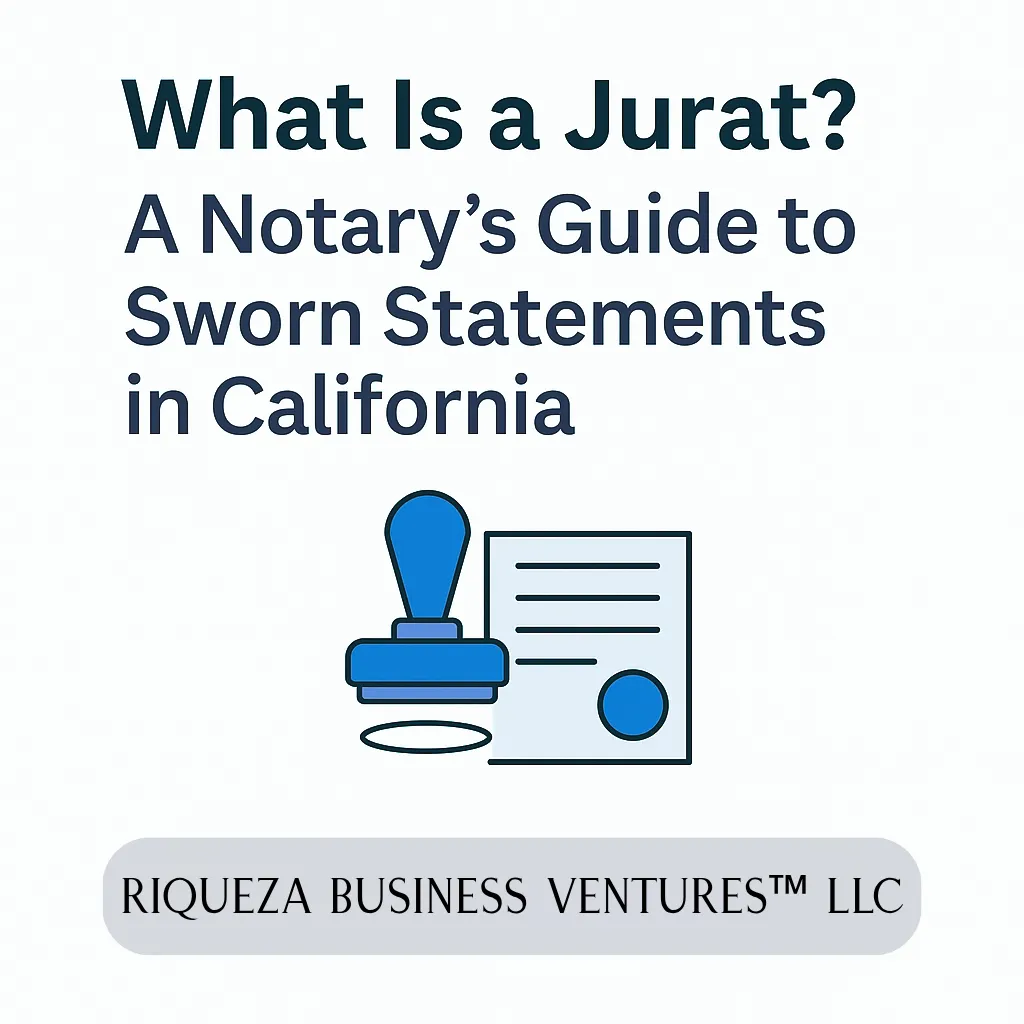
What Is a Jurat? A Notary's Guide to Sworn Statements in California
📑 What Is a Jurat? A Notary’s Guide to This Essential Document
If you're navigating legal paperwork, preparing an estate plan, or submitting sworn statements to a court or agency, you’ve probably encountered the term jurat. But what exactly is a jurat—and when is it the right choice?
At Riqueza Business Ventures™ LLC, we’ve guided hundreds of clients through documents that require a jurat or an acknowledgment. Knowing the difference between the two is critical—not only for legal accuracy, but also for peace of mind.
In this guide, we’ll explain what a jurat is, when it’s required, how it differs from other notarial acts, and what to expect during your signing appointment.

🖋️ What Is a Jurat?
A jurat is a type of notarial act where the signer swears or affirms that the contents of the document are true. The key distinction is that a jurat involves an oath or affirmation, which must be administered in person by the notary.
Once the oath is taken, the signer then signs the document in the notary’s presence. The notary completes a jurat certificate, which is attached to the signed document as proof of the sworn statement.
🔑 Think of a jurat as the notarial act used when truthfulness is central to the document’s purpose.
📄 When Is a Jurat Required?
You’ll most commonly see jurats in documents that contain sworn statements, such as:
Affidavits (used in court, immigration, or financial cases)
Depositions (used in litigation or testimony)
Sworn declarations for schools, government, or nonprofit filings
Certain estate planning documents, such as guardianship designations or advanced directives
DMV, insurance, or financial documents involving factual declarations
If the signer must attest to the truth of the content under penalty of perjury, the document likely requires a jurat.
🤝 Jurat vs. Acknowledgment: What’s the Difference?
Many clients are unsure which notarial act their document requires. As notaries, we cannot legally choose for you—but we can explain the difference.

🧭 Tip: If your document includes language like “subscribed and sworn to,” it likely requires a jurat.
📋 What to Expect at a Jurat Appointment
If your document requires a jurat, here’s how to prepare for a successful notarization:
✅ Sign In Person: You must sign the document in front of the notary—no exceptions.
✅ Be Prepared to Swear or Affirm: You’ll be asked to verbally confirm the truth of the document’s content.
✅ Bring Valid ID: California requires a current, unexpired government-issued photo ID.
✅ No Blanks: Ensure the document is complete and has no blank spaces before signing.
✅ Notary Completes the Certificate: The notary will fill in and attach the official jurat form after witnessing the signature and oath.
🛑 Can I Choose a Jurat If I'm Not Sure?
Notaries cannot legally decide which certificate to attach to your document. If you're unsure, we recommend:
Asking your attorney or the agency requesting the document
Reviewing the instructions in the document packet
Bringing both certificate types with you (your notary can explain the difference and let you decide)
🌟 Why Clients Trust Riqueza Business Ventures™ LLC
We’re proud to serve the San Francisco Bay Area with:
📍 Mobile notary services to your home, care facility, or office
🌐 Bilingual support in English and Spanish
🤝 Clear, professional guidance through estate documents, affidavits, and more
⏱️ Same-day, after-hours, and weekend appointments available
Whether you’re notarizing an affidavit for court, submitting an estate plan, or finalizing a sworn statement, we’ll make sure you feel prepared and confident.
🗓 Ready to Book?
Book your jurat notarization with ease—and get peace of mind with every signature.
📅 Schedule your mobile notary appointment today
👉 www.riquezabusinessventures.com
📞 Call or Text: 510-497-4509
